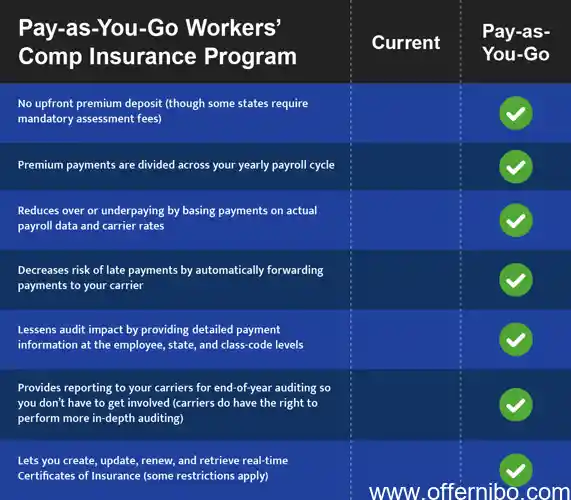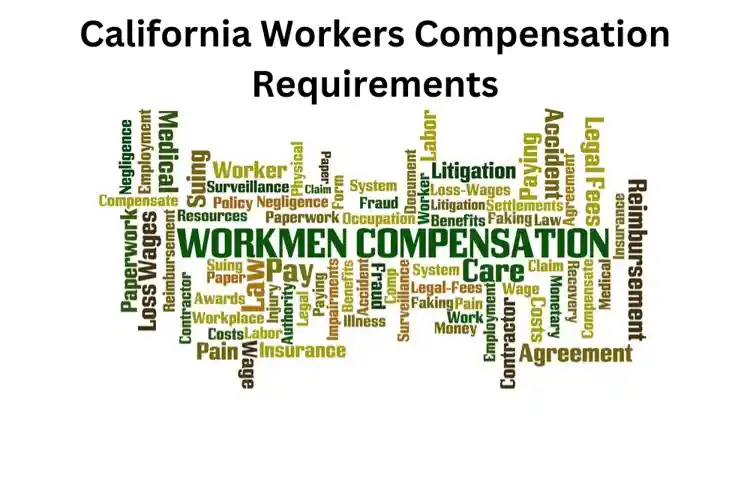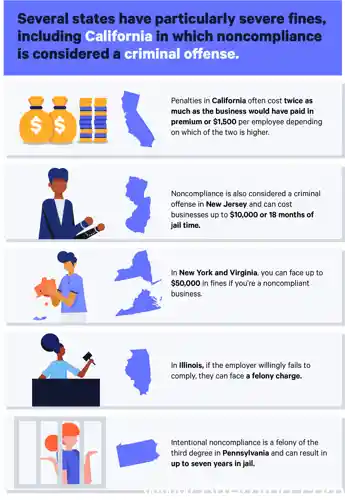As an employer in California, understanding and complying with workers’ compensation insurance requirements is crucial to protect your business and employees. Navigating the complexities of workers’ compensation laws can be daunting, but it’s essential to ensure a safe and compliant workplace.This comprehensive guide will provide you with an in-depth understanding of California’s workers’ compensation insurance requirements, helping you fulfill your legal obligations and safeguard your employees’ well-being. We’ll delve into the legal framework, coverage requirements, compliance considerations, claims processes, and best practices to help you manage your workers’ compensation insurance effectively.By the end of this guide, you’ll have the knowledge and tools to navigate the workers’ compensation system in California confidently, ensuring compliance, minimizing risks, and fostering a positive work environment for all.
Decoding California’s Workers’ Compensation Insurance Requirements: A Comprehensive Guide

If you’re an employer or employee in California, navigating the complexities of workers’ compensation insurance can be a daunting task. To help you make sense of it all, we’ve created this comprehensive guide that will provide you with a clear understanding of the legal framework, coverage requirements, claims process, and best practices for managing workers’ compensation insurance in California. Whether you’re new to the subject or looking to brush up on your knowledge, this guide will serve as your indispensable companion, providing you with the tools and insights you need to ensure compliance, protect your employees, and safeguard your business.
Understanding the Legal Framework of Workers’ Compensation Insurance in California
Navigating the workers’ compensation claims process in California can be complex, but understanding the steps can help you protect your rights. If you’re an employee who has suffered a workplace injury or illness, it’s crucial to act promptly. Report your injury to your supervisor immediately and seek medical attention. Then, file a workers’ compensation claim with your employer’s insurance carrier within one year of your injury or illness. The insurance company will review your claim and make a determination regarding coverage and benefits. If your claim is denied, you have the right to appeal the decision. Remember, seeking legal advice from an experienced attorney can guide you through the process and ensure your best interests are protected.
Types of Coverage Required for Employers in California
As you embark on operating a business in the Golden State, understanding the intricacies of workers’ compensation insurance in California is paramount to safeguarding your enterprise and the well-being of your employees. This comprehensive guide will illuminate the legal framework and requirements surrounding workers’ compensation insurance in California, empowering you to ensure compliance, navigate claims effectively, and manage insurance costs prudently. By delving into the nuances of this essential coverage, you’ll equip yourself with the knowledge to protect your business and employees from potential risks while fostering a safe and productive work environment.
Ensuring Compliance with California’s Workers’ Compensation Laws

Ensuring compliance with California’s workers’ compensation laws is crucial for employers to avoid costly legal consequences and protect their employees’ rights. Failure to obtain the required insurance coverage can result in substantial fines, penalties, and even criminal charges. It’s your responsibility as an employer to provide a safe working environment and maintain adequate workers’ compensation insurance to cover medical expenses, lost wages, and other benefits for employees who suffer work-related injuries or illnesses. By understanding the legal framework and complying with these requirements, you can safeguard your business and ensure the well-being of your employees.
Penalties and Consequences for Failing to Comply
As a California employer, it’s crucial to ensure your compliance with the state’s workers’ compensation laws. Failure to do so can lead to penalties, financial burdens, and potential legal complications. By understanding the legal framework and meeting the coverage requirements, you can protect yourself and your business. Non-compliance can put your employees at risk and damage your reputation. Take proactive steps to ensure your business is compliant, allowing you to operate smoothly and focus on what matters most—your business success.
Navigating the Workers’ Compensation Claims Process in California

Navigating the workers’ compensation claims process in California can be daunting, but understanding your rights and responsibilities is crucial. If you suffer a work-related injury or illness, filing a claim promptly is essential to protect your rights to medical treatment, wage replacement, and other benefits. The process involves several steps, including reporting the injury to your employer, seeking medical attention, and submitting the necessary paperwork to the insurance carrier. Remember, workers’ compensation laws are in place to ensure you receive fair compensation for work-related injuries, so don’t hesitate to initiate the claims process if you need assistance.
Steps for Employees to File a Workers’ Compensation Claim
Navigating the workers’ compensation claims process in California can be a daunting task, but it doesn’t have to be. By following the correct steps, you can ensure that your claim is handled fairly and efficiently. First, if you suffer a work-related injury or illness, you must report it to your employer immediately. You have 30 days to file a formal claim with the California Workers’ Compensation Appeals Board (WCAB). Once your claim is filed, you will be assigned an adjuster who will investigate your claim and determine if you are eligible for benefits. If your claim is approved, you will receive benefits such as medical care, temporary disability payments, and vocational rehabilitation. If your claim is denied, you have the right to appeal the decision. By understanding the claims process and your rights, you can navigate the system and get the benefits you deserve.
Appeals and Dispute Resolution Options
Navigating the workers’ compensation claims process in California can seem like a daunting task, but with the right guidance, you can navigate it successfully. Understanding your rights and responsibilities as an employee is crucial. The first step involves filing a claim with your employer within 30 days of the injury or illness. It’s essential to provide accurate and detailed information about the incident, including the date, time, location, and any witnesses. Once the claim is filed, the insurance carrier will investigate and determine if it’s compensable. If approved, you’ll receive benefits such as medical expenses, lost wages, and disability payments. However, if your claim is denied, you have the right to appeal the decision through the Workers’ Compensation Appeals Board. Remember, seeking legal advice from an experienced attorney can provide valuable support throughout the claims process, ensuring your rights are protected.
Exemptions and Exceptions to California’s Workers’ Compensation Requirements

California’s workers’ compensation insurance requirements aim to provide comprehensive protection for employees who sustain work-related injuries or illnesses. However, there are certain exemptions and exceptions to these requirements that you should be aware of. These exemptions may apply to specific types of employers, employees, or work activities. Understanding these exemptions is crucial for ensuring compliance with the law and avoiding potential penalties. By familiarizing yourself with the nuances of these requirements, you can ensure that your business is operating within the legal framework and that your employees are receiving the protection they deserve.
Best Practices for Managing Workers’ Compensation Insurance in California
As a business owner in California, ensuring compliance with workers’ compensation insurance requirements is crucial for protecting both your employees and your company. By implementing best practices for managing this insurance, you can effectively mitigate risks, reduce premiums, and create a safe and secure work environment. This comprehensive guide will provide you with strategies to navigate the complexities of workers’ compensation insurance in California, including understanding the legal framework, navigating the claims process, and leveraging risk management techniques. Together, we’ll explore the essential steps and considerations to ensure your business is well-protected against workplace injuries and liabilities.
Strategies to Reduce Premiums and Control Costs
As an employer in California, managing workers’ compensation insurance effectively is crucial for safeguarding your business and employees. To minimize expenses and maximize coverage, consider adopting these best practices:
-
Implement a robust risk management program that proactively identifies and mitigates workplace hazards, reducing the likelihood of injuries and claims.
-
Regularly review and update your insurance policy to ensure it aligns with your evolving business needs and compliance obligations.
-
Establish a clear and comprehensive claims management process to ensure prompt and fair handling of employee claims, fostering a positive workplace culture.
-
Partner with a reputable insurance carrier that provides not only coverage but also proactive risk management guidance, helping you optimize your insurance program and minimize costs.
-
Proactively communicate workers’ compensation rights and responsibilities to employees, empowering them to report injuries promptly and access necessary support.
By embracing these best practices, you can effectively manage workers’ compensation insurance in California, ensuring compliance, protecting your employees, and safeguarding your business’s financial stability.
Utilizing Risk Management Techniques to Prevent Workplace Injuries
Managing workers’ compensation insurance in California efficiently requires embracing best practices that safeguard your business and employees. Implementing proactive strategies to reduce premiums and control costs can significantly impact your bottom line. One effective approach is to establish a comprehensive safety program that prioritizes workplace safety. This involves identifying and mitigating potential hazards, providing safety training for employees, and enforcing established safety protocols. By proactively addressing safety concerns, you can reduce the likelihood of accidents and subsequent claims, leading to lower insurance premiums. Additionally, embracing risk management techniques like ergonomics assessments and employee wellness programs can further minimize the risk of injuries and promote a healthier work environment.
Frequently Asked Questions (FAQs) about Workers’ Compensation Insurance in California
Frequently Asked Questions (FAQs) about Workers’ Compensation Insurance in California
Do you have questions about workers’ compensation insurance in California? You’re not alone. Many employers and employees have questions about their coverage, the claims process, and their rights and responsibilities. To help you better understand this complex topic, we’ve compiled a list of frequently asked questions and answers. By arming yourself with this knowledge, you can ensure compliance with California’s workers’ compensation laws, protect your employees, and mitigate any potential risks or disputes.
Q1. What are the minimum requirements for workers’ compensation insurance in California?
Ans: All employers with one or more employees must have workers’ compensation insurance.
Q2. Who is considered an employee for the purposes of workers’ compensation insurance?
Ans: Any person who performs services for an employer for wages or salary.
Q3. What types of injuries and illnesses are covered by workers’ compensation insurance?
Ans: Any injury or illness that arises out of and in the course of employment.
Q4. How much does workers’ compensation insurance cost?
Ans: The cost of workers’ compensation insurance varies depending on a number of factors, including the number of employees, the type of industry, and the claims history of the employer.
Q5. What are the penalties for failing to have workers’ compensation insurance?
Ans: Employers who fail to have workers’ compensation insurance may be subject to fines, penalties, and imprisonment.
Q6. How can I get workers’ compensation insurance?
Ans: You can get workers’ compensation insurance from a private insurance company or through the State Compensation Insurance Fund (SCIF).